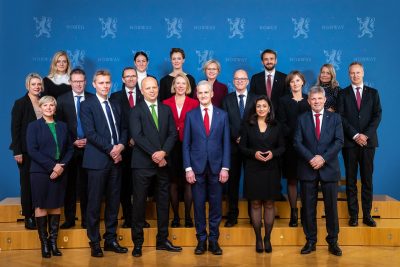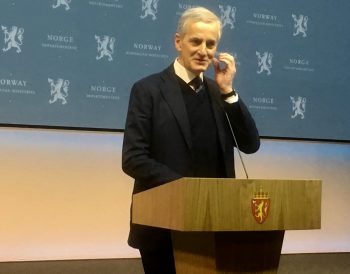Relaxing Corona restrictions may boost their support, but Norway’s new government suffered yet another disastrous dive in voter satisfaction this week. The two government parties, Labour and Center, fell 7.5 percentage points in the latest public opinion poll, leaving Labour with just 18.9 percent of the vote and Center with 9.4 percent.

“This is a very dramatic decline for the government parties,” election researcher Johannes Bergh told the labour-oriented news service FriFagbevegelse on Thursday. “The only good news for Labour and Center is that it’s a long time until the next election.”
Labour has never logged such low voter support, while Center can claim only half the support it enjoyed a year ago. Labour’s election result of 26.3 percent was historically poor, but enough to let Labour Party leader and Prime Minister Jonas Gahr Støre form an albeit minority government with Center and its leader, Trygve Slagsvold Vedum, after Center won 13.5 percent of the vote.
Now, notes Bergh, the new poll (conducted by research firm Opinion by the left-leaning FriFagbevegelse, newspaper Dagsavisen and media organization ANB) reflects earlier polls and confirms a trend that began shortly after the election: “The numbers are real, and both Labour and Center have lost many voters since the election.” Political commentator Lars West Johnsen wrote in Dagsavisen on Thursday that “Støre’s government project is in extremely poor shape right now.”
Blames ‘Covid and high electricity prices’
Støre himself told a group of foreign correspondents in Oslo last week that “there are two things in life right now, Covid and high electricity prices,” and the public isn’t happy with either. Støre suggested that’s taken attention away from all the other things on his government’s agenda.

“Government business is much more” than those two nagging issues, Støre claimed, preferring to focus on “our mandate” to redistribute wealth more fairly and reform the labour market “even though inequity is lower in Norway than in many other countries.”
In addition to dealing with the Corona virus and unusually expensive electricity, Støre has also suddenly been caught up in rising public debate over whether his predecessor as Labour Party leader, Jens Stoltenberg, should become the new chief of Norway’s central bank. The decision will be made by Vedum in his role as finance minister, but the debate over potential conflicts of interest, power broking and whether Stoltenberg has far too much political baggage has also been harmful for Støre.
Labour and Center, meanwhile, are caught in various arguments of their own within the government. Both parties supported reversal of controversial and forced local government mergers, but now local Labour officials are resisting a break-up of Norway’s largest merged county of Viken. That has infuriated lots of Center politicians along with some like-minded Labour officials, who claim several Labour ministers now want to keep Viken intact and break campaign promises.
There’s also been public outcry over proposals, now backed by Støre himself, to overturn environmental protection of rivers and waterfalls and develop them to harness more hydroelectric power. Eleven environmental organizations asked Støre to hinder exploitation of scenic waterways, but Støre has already refused, saying he won’t rule out development. Center already supports it.
The public is clearly not impressed. Never has Labour performed more poorly in public opinion polls, nor has a new government lost favour so quickly. Both Labour and Center are now clearly on the defensive, instead of the offensive where new governments are supposed to be. Not only is their government honeymoon over, there never was one.
Støre’s deputy Labour leader Bjørnar Skjæran, who now also serves as fisheries minister, conceded that the poll results are “bad.” He added, though, that “it’s not unnatural that those of us holding government responsibility are being punished for the historically high electricity prices and new waves of Corona infection.” The Center Party’s Geir Pollestad agreed: “It’s been a tough autumn with the energy crisis and Corona. Our goal is to rank higher than this.”
newsinenglish.no/Nina Berglund

